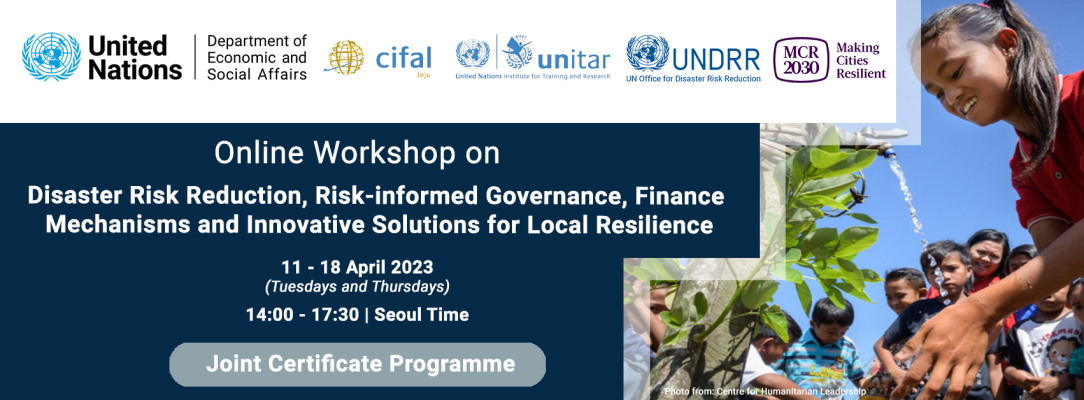Background
The 2030 Agenda for Sustainable Development places great importance on disaster risk reduction (DRR) as a cross-cutting element in the achievement of the Sustainable Development Goals (SDGs). The 2030 Agenda proposes concrete commitments to reduce risk, vulnerability, build capacity and promote resilience to disasters. Reducing disaster risk and building resilience are interrelated thrusts of the 2030 Agenda for Sustainable Development and the Sendai Framework for Disaster Risk Reduction 2015-2030. The Sendai Framework calls on governments to move towards risk-informed governance arrangements that include broader hazard and risk scope and incorporate the concept of systemic risk. Priorities of the Sendai Framework expressly call for strengthening disaster risk planning, governance and financing to manage disaster risk.
This training will provide concepts, tools and approaches for the Sendai Framework for Disaster Risk Reduction 2015-2030 at the local level, and provide an opportunity to learn about the global initiative on Making Cities Resilient (MCR2030) launched in 2020 to ensure cities become inclusive, safe, resilient and sustainable by 2030, contributing directly to the achievement of Sustainable Development Goal 11 (SDG11) and other global frameworks including the Sendai Framework for Disaster Risk Reduction, the Paris Agreement and the New Urban Agenda. It will also introduce the Handbook on Strengthening Resilience in Cities and Local Communities through Innovation and Digital Governance as well as the Toolkit on Risk-informed Governance and Innovative Technology for Disaster Risk Reduction and Resilience, which is part of UN DESA’s Curriculum on Governance for SDGs and provide specific guidance on leveraging innovative technologies for disaster risk reduction and resilience. The training will take stock of mechanisms and tools to enhance local financial resilience to disaster and leverage global climate finance to ease the challenges ahead for the actual implementation of disaster resilient governance and planning.
Note: UN DESA/DPIDG/UNPOG, UNITAR CIFAL Jeju/JITC, and UNDRR ONEA & GETI will issue a joint certificate of participation to participants upon successful completion and meeting the requirements of the training.
Documents
Concept Note and Agenda
Final Report
Contact Information
UN DESA/DPIDG
Mr. Juwang Zhu
Director
Division for Public Institutions and Digital Government (DPIDG)
United Nations Department of Economic and Social Affairs (UN DESA)
Ms. Adriana Alberti
Chief, Programme Management and Capacity Development Unit
DPIDG/UN DESA
E-mail: @email
UN DESA/DPIDG/UNPOG
Mr. Kyu Chang Ko
Head, UN Project Office on Governance
UNPOG/DPIDG/UN DESA
Ms. Ana Cristina Thorlund
Governance and Public Administration Expert
UNPOG/DPIDG/UN DESA
Email: @email
Mr. Samuel Danaa
Associate Capacity Development Expert
UNPOG/DPIDG/UN DESA
Email: @email

 Welcome to the United Nations
Welcome to the United Nations